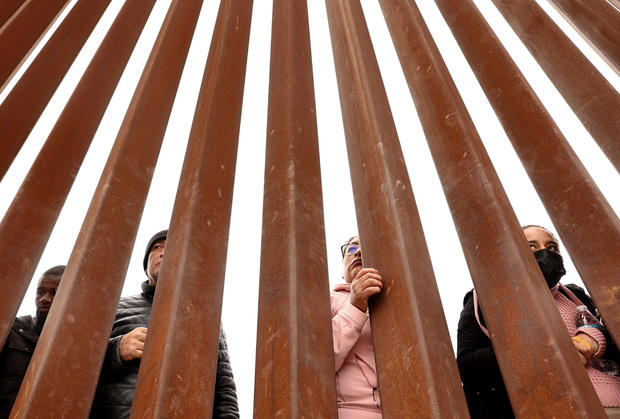Immigration advocates said President Biden’s new border policy is a draconian restriction that will “effectively eliminate asylum” for most migrants. Republican officials in Texas, however, said the opposite is true, warning that the regulation will trigger an “influx of migrants” with unvetted asylum claims.
Both groups were describing the same Biden administration policy in separate lawsuits, but their reasons for challenging it were completely different.
Enacted earlier this month, the Biden administration rule disqualifies migrants from asylum if they did not first seek refuge in a third country before reaching the U.S. southern border. Those who cross the border unlawfully and fail to prove they deserve an exemption to the rule face swift deportation and a five-year banishment from the U.S.
The rule is the centerpiece of the administration’s broader effort to reduce illegal border crossings, which recently reached record levels. It penalizes those who enter the country without permission, while expanding opportunities for migrants to come to the U.S. legally.
In their lawsuit earlier this month, the American Civil Liberties Union (ACLU) and other advocacy groups said Mr. Biden’s rule, just like two Trump administration asylum restrictions blocked in federal court, violates laws Congress passed in 1980 to protect refugees fleeing persecution.
In a separate lawsuit filed this week, Texas’ Republican Attorney General Ken Paxton also argued the regulation was unlawful, but he focused his criticism on a provision that instructs migrants to wait in Mexico until they secure an appointment via a phone app to enter the U.S. at an official border crossing. Those who enter the U.S. with one of roughly 1,000 appointments distributed each day are not disqualified from asylum.
The strange bedfellows’ lawsuits, both of which seek to block the asylum restriction in its entirety, could imperil Mr. Biden’s strategy to manage migration to the U.S. southern border, where migrants have been coming in greater numbers and from more countries than ever before amid mass displacement in Latin American and the Caribbean. Federal judges in Oakland and Del Rio, Texas, could rule on these cases later this year, setting off a high-stakes legal battle that could reach the Supreme Court.
/ Getty Images
But beyond their legal and practical implications, the lawsuits illustrate the thorny political spot the Biden administration finds itself in on border policy.
Progressive advocates say Mr. Biden has been too tough on migrants and too reliant on deterrence policies embraced by former President Donald Trump. Republicans, meanwhile, continue to argue the current migration crisis is one of Mr. Biden’s own making, accusing his administration of lax border enforcement.
The lawsuits also highlight the perils of federal immigration policy-making amid decades of congressional inaction on the issue. Like his predecessors, Mr. Biden has exercised his executive authority broadly to enact major immigration policies, at the southern border and in the interior. And like his predecessors’ unilateral changes, Mr. Biden’s policy agenda has been challenged, and at times derailed, by lawsuits.
“Before you get to the point of another administration coming in, a court will wipe out a rule or policy with an injunction and it has to be changed immediately,” said Theresa Cardinal Brown, a former U.S. immigration official under former Presidents George W. Bush and Barack Obama. “It’s a whip-sawing effect on policy.”
A Texas lawsuit, for example, prevented the Obama administration from giving work permits and deportation protections to unauthorized immigrants whose children were American citizens or permanent U.S. residents. The Trump administration’s numerous asylum restrictions, migrant family separation policy and efforts to slash legal immigration faced dozens of often successful legal challenges from Democratic-led states and advocacy groups like the ACLU.
That trend has continued, if not intensified, under Mr. Biden. During his first two years in office, Texas and other Republican-led states convinced judges to block a 100-day moratorium on most deportations, rules limiting arrests by Immigration and Customs Enforcement (ICE) and the termination of a Trump-era policy known as “Remain in Mexico” that forced asylum-seekers to wait for their court dates outside the U.S.
Republican state officials prolonged the termination of the Title 42 public health order — which allowed border agents to expel migrants without asylum screenings — for a year. The pandemic rule only ended this month because the expiration of the COVID-19 national emergency nullified the legal challenges.
ALFREDO ESTRELLA/AFP via Getty Images
More recently, a federal judge granted Florida’s request to halt a Biden administration migrant release policy that was intended to mitigate overcrowding inside Border Patrol facilities. Another federal judge in Texas is also expected to rule soon on a request by Republican-led states to force the Biden administration to terminate the Deferred Action for Childhood Arrivals (DACA) program for 600,000 immigrant “Dreamers.”
Other cases remain unresolved, including Texas’ bid to shut down a popular program that allows up to 30,000 Cubans, Haitians, Nicaraguans and Venezuelans with U.S.-based financial sponsors to come to the country lawfully each month.
Cardinal Brown, now a senior adviser at the Bipartisan Policy Center, said Congress’ failure or reluctance to change immigration law in any significant way since the 1990s has led states and groups that disagree with the administration in power to stage policy fights in the federal court system.
“The main reason we’re seeing these particular lawsuits by the states is a political and policy difference of opinion,” Cardinal Brown said. “The judiciary is not supposed to be a policy-making body, and we’re asking it to essentially make policy.”
In a recent briefing, Blas Nuñez Neto, the highest-ranking immigration and border policy official at the Department of Homeland Security, said the lawsuits “clearly demonstrate just how fundamentally broken our immigration system is.”
The administration, Nuñez Neto argued, is employing “innovative” executive actions to deter illegal border entries, which dropped sharply after Title 42 lapsed on May 11. Asked by CBS News if the administration had a Plan B or C to manage border crossings if the lawsuits prevail, Nuñez Neto pivoted to Congress.
“At the end of the day, we are just clear-eyed that there is no lasting solution here that does not involve the U.S. Congress,” he said.


